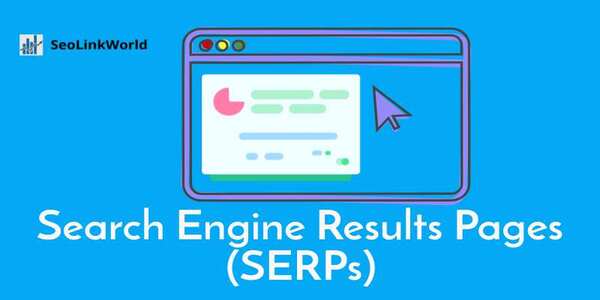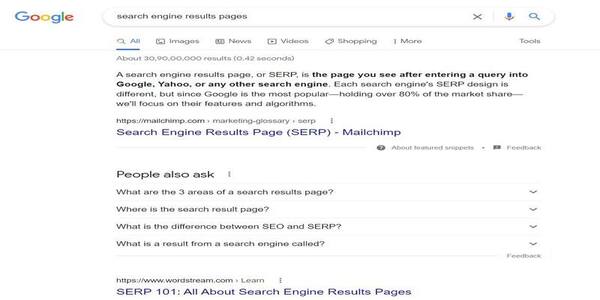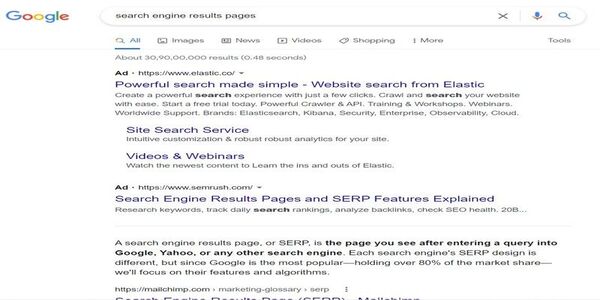Have you ever tried to find out the name of the search engine results pages on the search engine where you see results? Okay, let us understand these things from the very beginning.
For example, if you want to make cookies. But you do not know how to cook them, what will you do? Either you will read a blog or go to YouTube to see videos of recipes. Let us assume you are looking for an article.
So, you search “how to make cookies” in Google or an alternative search engine. On the result page, we see a blue highlighted list of some results (web pages). Which is known as the “search engine results pages.” These are the pages that provide significance to the customers. From my perspective, it acts as a buffer state between your query and the results.
Remember, the SERP on every query is different. For this reason, every search engine provides the best possible solutions to users. And they do not practice discrimination.

So, in that case, you have seen that as you change your keyword phrase. Correspondence results change because search engines do their work based on emotion. But it always provides the most relevant results to its users. SERP full form is search engine result pages.
Table of contents
Why is the Importance of the Search Engine Result Page?
From a user’s perspective, if you want absolute knowledge on a particular topic. You must choose the best answer. But you need a platform where you have many options to read. And compare to get an appropriate solution to your question.
A domain name owner expects to index website on Google. And increase organic traffic to their website. In that case, SERP in search engine acts as an important factor for them. Consider the following:
We said SERP is the buffer zone between a user’s query and solutions. But there is a term known as “no-click searches”. Consider you have a question, “What is the capital of the USA?” You cannot target it because when you search for it on Google. The featured answer will pop up at the top of the result and just below the search bar.
So, users will stop scrolling 99 out of 100 times because they have their answers.
That is why you have to choose your topic carefully to get.
There are Two Kinds of Results We Usually See in the Search Engine.
- Organic Search Engine Results Page
- Paid Search Engine Result Page
What is an Organic Search Engine Results Pages?
During the query search, we saw results on the result page. Generally (if you do not make any settings), a search engine shows ten organic results, but it can be less than ten. Those listing websites in the organic search results work on search engine algorithms. And there are professionals named SEO experts. And they optimize your blog for SEO by following all the rules of the search engine? It means an ethical process of search engine optimization.
SEO Content depends on many aspects. Such as on-page SEO, off-page SEO, technical SEO, and basics of SEO. To know more, kindly read, “What is SERP?” Below are the Search engine results page examples.

Paid Search Engine Result Page (PSERP)
Pay per Click (PPC) is an ethical method in search engine marketing. You must have seen the featured Google ads or ads on Bing search engines.
For example, if you want to book flight tickets to New York. When you search for this keyword phrase in a search engine, you will see featured ads just below the search box. You can recognize it by seeing ads with them.
You have to pay the search engine to run your campaign. Pay per click works on the auction method. It means a high bid to grab the top rank. And that tends to bring more business and can turn your business into a brand.

So, in short, we have informed you about the paid search results page.
There are Three Types of Internet Search in Search Engines.
We have mentioned it below, and kindly read it once for a better perspective.
Informational
Those looking for information on a particular topic should look it up. For example, if you want to know about George W. Washington, search for his name on Google, and you can read about him. One thing is sure: you will not find many commercial results for him.
Navigational
Assume you visited a website or blog a couple of months ago and are unable to visit it again. Or you have forgotten its name, and its history has been cleaned. In that case, people do the navigational search. They search for things related to those websites. And after doing a little hard work to find them.
Transactional
In this type of search intent, most likely, paid results are included. By default, it has more commercial intents. It means users who want service or looking for a product to purchase use transactional searchers. So, when PPC experts run a campaign, they take care of these things.
Related Topics
- Google Search Console
- What is Keyword Difficulty?
- Difference Between SEO and SEM
- Video Search Engines
- Shopping Search Engines
- Google vs. DuckDuckGo
- Image Search Engines
- Benefits of Using Long-Tail Keywords in SEO
- Reasons to Use Google Webmaster Tools
- Tools and Metric for Tracking SEO Performance
- What is Local Listing in SEO?